Michael Sheen: a truly progressive pilgrim
Leaving Hollywood to move back to his drug-ridden hometown is an extraordinary career move. But Michael Sheen is no ordinary man. The three days he spent re-enacting Jesus’s last days changed him forever.
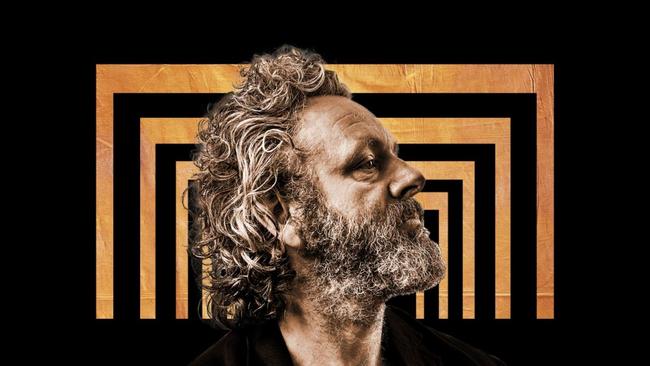
Michael Sheen is best known as a stage, film, and television actor – playing Tony Blair in the film The Queen, the lead role in cable television series Masters of Sex, more recently Good Omens, and much else. He has just finished a season starring at the Sydney Opera House as Antonio Salieri in Peter Schaffer’s play Amadeus.
What is less well known is the breadth of Sheen’s interests, his vitality, and the extraordinary variety of projects he takes on. He is not the stock Hollywood celebrity, if there is such a thing. In my eyes, for want of a better description, he is a singular modern-day pilgrim, a secular one, a force unto himself, taking on life at the full as he hurtles along its street of imperceptible corners. And reflecting with intelligence and vivid articulacy on what transpires.
My first encounter with him was seven years ago when he approached me out of the blue to join him in a BBC radio interview on a book I had written on Mark’s Gospel, The Existential Jesus. The prompt was a re-enactment he had carried out, in his hometown in industrial Wales, Port Talbot in 2011, of the last three days of Jesus’ life – three days of continuous live theatre – from the Friday morning of the crucifixion to the Sunday evening. We met in person a year later when he came over to Paris to visit when I was on family holiday there.
Sheen co-scripted the Port Talbot Passion and played the lead role as a modern Jesus in a modern setting, including recruiting thousands of ordinary locals as his cast. But his script provided no more than the surface story, one that enabled a lot of improvisation to erupt from within the chemistry of the moment. This might be called interpretative theatre, for actor and audience alike, all participants in a drama with a loosely known script, with the opportunity to observe themselves and events as they unrolled. The three days provided the opportunity to come out a bit, for one and all, to get to know themselves a little better, with the aid of the classical story. The story serves as a kind of spotlight shining on the messy murk of a life, bringing clarity and shape, at least for a magical interlude. Further, the Shakespearean theme of all the world being a stage, and life being performance, was given full exploratory voice.
Later he reflected that it seemed as if a benevolent spirit took over the event and guided it. He himself was not only inspired and possessed, and exhausted, but for weeks afterwards overwhelmed by memory, dream, and reflection: “Life and art totally blurred. It was very frightening at times. The power that was unleashed and was coursing through that place. I could feel it, as could everyone that was there, and we were all changed by it. I understood how and why drama emerged and came to be. I understood the nature of sacrifice and ritual and shared experience and catharsis. But, ultimately, something mysterious and bigger than all of us that were there walked the streets that weekend, and we all knew it. It answered every question I’ve ever had. It banished every doubt.”

More recently, Sheen has moved back to live in Port Talbot – far from Los Angeles, New York, or London – with his partner and two very young children. Port Talbot is seen by some from the outside as dirty, marginalised, plagued with alcohol and drug problems, and all that follows; and quite literally passed over with a huge overhead motorway cutting it in half. He has dedicated himself to charity work there – having been inspired partly by a painting he saw in the Vatican of Jesus ministering to the poor.
He worked for a couple of years organising the Homeless World Cup soccer tournament to be played in Cardiff in 2019 – soccer is one of his passions, with him even, at the age of twelve, having been offered a place in Arsenal’s youth team. Five hundred people from 50 countries were to attend, all with experience of homelessness and social exclusion, representing their countries in a potentially transformative experience. With two months to go, betrayed by someone he thought he could trust, the bank account was empty, owing £2m. Sheen decided he couldn’t let the participants down, so he ended up giving everything he had, including taking out large loans on his own property, and backing himself to earn the money back through acting. The tournament was a huge success.
Switching to today, it was, I think, a brilliant move by the Opera House to choose Amadeus for its 50th anniversary, and then a coup to entice Sheen to play the central role of Salieri. He had played the secondary part of Mozart in the play years ago in London and New York. Salieri is a phenomenally gruelling role in the three-hour play, not helped by him contracting a stomach bug and laryngitis soon after arriving in Sydney. I caught up with him for lunch in Balmain the day after his final performances. But first, the production itself.
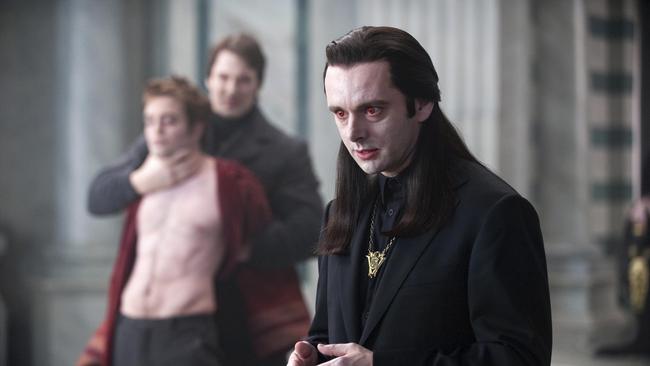
The bare bones of the story are that Antonio Salieri, before he met Mozart, was an acclaimed composer in Vienna, rich, with high aristocratic status, an artistic celebrity in his own right. He had every right to feel satisfied with his life. Mozart arrives. Salieri finds himself double-cursed, by being born a contemporary of Mozart, and, on top of that, having the talent to recognise the genius of Mozart’s music – which he describes as so sublimely beautiful it was as if the “voice of God” was speaking. He is confronted on the instant with his own inferior talent. He puts it later: “We were both ordinary men, he and I, yet from the ordinary he created legends, while I made legends ordinary.” He rants at God for not choosing him, Salieri, a virtuous and loyal servant, as his voice, rather than this childish, immoral creature – as he caricatures Mozart the man. He concludes bitterly towards the end: “I am the patron saint of mediocrity.”
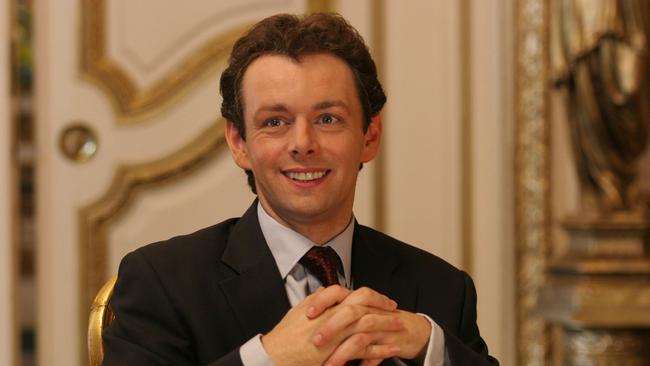
The Opera House production was a tour de force. With live orchestra and singers set high on a tiered stage, projecting this exquisite music over the actors below – the right place for the voice of God – the ordinary mortals played out this tale of visceral envy, and rage against fate and an unjust universe.
It was a reminder of the immediate dramatic force of live theatre, which in comparison, made even the brilliant 1984 film of Amadeus seem pale. The spectator is taken out of normal profane time, out of his or her everyday self, seized by the unfolding drama, and plunged into a deeper, eternal shadowland of tragic gravity, shaken, fazed, in wonder at the mystery. Here was the achievement of Greek tragedy, recaptured in the Sydney Amadeus.
And this story is for everyone. Sheen/Salieri speaks to the audience at one point directly from the stage, addressing them as ghosts to be – in effect saying, “You too out there in the dark are all, like me, going to die!” He addresses the fears of failure in everyone, the questions about whether they have chosen the right life path, whether they are using the talents they have been given, whether they could not do better, and whether there is any ultimate sense to who they are and what they do.
I asked Sheen where he found the inner Salieri to be able to play this role – for the Michael I know seems very un-Salieri like. He replied it was through questioning what he had done, both as an artist and in a career that was well advanced, and on the choices he was making in his life. Salieri exposes the most basic and existentially testing of insecurities. The patron saint of resentful mediocrity casts a much wider net than music.
The turning point on stage comes midpoint. For the first half, Salieri is shaken and unsure, bewildered, with his whole existence ripped apart, and throughout he is diminished by Mozart’s music. The music in its peerless greatness is the main character. Then, as Salieri explodes in despondent, accusatory rage against God, he is struck down by blinding light – an inversion of Paul on the Road to Damascus.
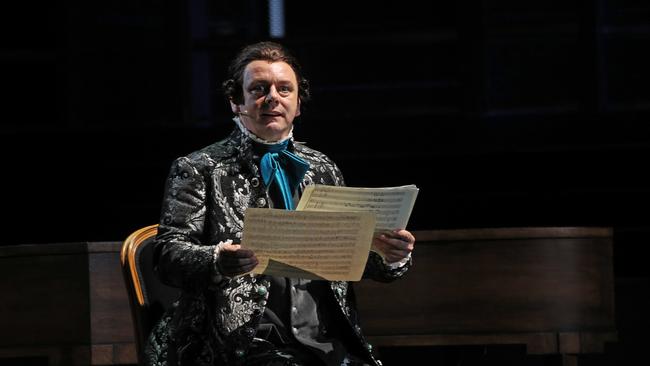
Although it is Salieri’s story throughout, it is really from the opening of the second act that Sheen’s character takes over, driven by monstrous fury – his remaining passion. As the new self-appointed Master of Ceremonies, he sets out to destroy Mozart, which he accomplishes by ruining him financially. It could have been that Salieri simply accepted himself as a talented composer enjoying his own gifts, while being deeply moved by Mozart’s music, which he loves, and is grateful for. But that is not his character. Salieri switches, in his critical life either-or, into a demented architect of doom. He cannot stand to be second rate – mind, who is not second rate next to Mozart.
Yet he is deeply ambivalent. Sheen sees Salieri, in part, as unconscious father to Mozart, whom he loves as much as hates, a father who is driven by God to kill his son, mimicking the story of Abraham and Isaac. Further, Salieri knows that it is really himself whom he is killing, he impotent in life as in music. So, as the drama slowly builds to a crescendo, we are left with two sad, very sad figures, circling round each other centre stage.
At every turn Salieri, although successful in his own career, loses. Close to the end, with Mozart emaciated, crazed, and drunk – dying – Salieri thinks he has finally won. Then he attends The Magic Flute, and hears more utterly exquisite music, which he reads as God mocking him one last time, in his own divine triumph. Mozart is unkillable. Salieri is one of only five to attend Mozart’s burial, in a pauper’s unmarked mass grave.
There are many classical traces in this story, as it echoes Job, Abraham and Isaac, Shakespeare’s deformed King Richard III, and above all Judas.
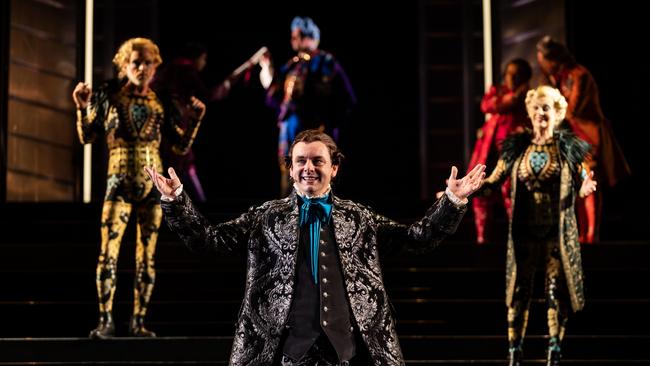
Judas is likewise double cursed, being born in the same time and place as Jesus, with the insight to see the extraordinary nature of the Master’s character – the man Judas would like to be, but is not. Judas envies the man himself – the essential man – as much as the fact that God has chosen him. Berserk with humiliation, he is driven to remove Jesus from his presence, annihilate him.
Salieri too, in Sheen’s reading, envies the man as well as the voice. For Mozart is completely unrepressed, a free spirit in both life and music, whereas Salieri is an uptight respecter of proper forms, out of touch with his own inner self. Salieri is too inhibited ever to be a conduit for the voice of God. In today’s age of voyeuristic social media, he is warning to be true to self and not envious of the beauty or performance of others.
Salieri sees, almost as a revelation, that God has needs – he needs Mozart – which Sheen interprets as he, Salieri, realising that he too has needs, ones to which he has always been blind. But it is too late, leaving him with the one hope that he will, at least, have the negative fame of being the one who killed Mozart, in effect the one who killed God.
Sheen, who clearly has a perfectionist work ethic, channelled these reflections into an imposing, high-definition performance. His Salieri came to command the stage, in a struggle to the death with Mozart’s music, with God, and with himself. While Salieri loses on all fronts, he does manage to express one deep need, to be the magnificent storyteller of his own downfall into madness and death.
Perhaps here too is Sheen’s own ultimate mission, chosen or not, to awaken in tens of thousands of others a story of fundamental significance – and, in the process, meditate on it himself. Maybe, to press further, Amadeus articulates the key human polarity. There is, on the one hand, the higher yearning, to find contact with the sublime, the realm of spirit, in transformation beyond self, as if swept away, hearing the sacred tune. On the other hand, there are worldly cares and tribulations, the melange of low desires, spiteful motives, flawed character, and unfortunate circumstances – all of which tend to bog life down in a spiritless, desolate nether realm. Salieri wrestles with the angel, which in his own case is Mozart and his music, trying to find a way to integrate high and low, but fails spectacularly. It is one of Sheen’s gifts to have brought this all to vibrant life.
John Carroll’s book The Saviour Syndrome will be published on April 4.
